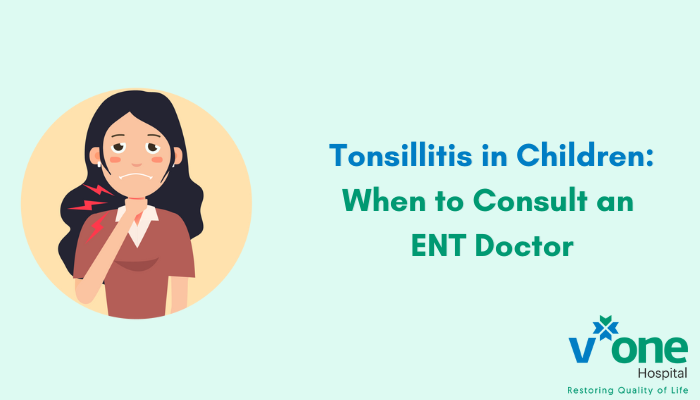Tonsillitis in Children: When to Consult an ENT Doctor
As parents, one of the most difficult things to see is your child feeling unwell. Sore throats, fever, and difficulty swallowing are common signs that something is wrong — and often, tonsillitis is the culprit. While many cases of tonsillitis can be managed at home, some situations require the expertise of a specialist.
In this blog, we’ll explore what tonsillitis is, its symptoms, treatment options, and when you should consider consulting an ENT doctor in Indore for your child’s care.
What Is Tonsillitis?
Tonsillitis is the inflammation of the tonsils, two oval-shaped pads of tissue located at the back of the throat. The tonsils act as the body’s first line of defense against infections, but they themselves can become infected by viruses or bacteria.
Tonsillitis is especially common in children between the ages of 5 and 15, as their immune systems are still developing and they’re often exposed to germs at school or daycare.
Common Symptoms of Tonsillitis in Children
It’s important for parents to recognize the early signs of tonsillitis. Some symptoms include:
-
Sore throat
-
Difficulty swallowing
-
Red and swollen tonsils
-
White or yellow coating on the tonsils
-
Fever and chills
-
Bad breath
-
Swollen lymph nodes in the neck
-
Ear pain
-
Loss of appetite
-
Fatigue or irritability
Sometimes, young children may not be able to express how they feel, so watch for signs like refusal to eat, drooling due to pain while swallowing, or unusual crankiness.
Causes of Tonsillitis
Tonsillitis can be caused by:
-
Viral infections: Such as the common cold or flu viruses. Viral tonsillitis usually resolves on its own.
-
Bacterial infections: Particularly Streptococcus bacteria, which cause strep throat. Bacterial tonsillitis may require antibiotics for treatment.
Identifying the cause is important because it helps determine the right course of action, whether home care, antibiotics, or a specialist’s intervention.
Home Care Tips for Mild Tonsillitis
In many cases, mild tonsillitis can be managed at home. Here’s what you can do:
-
Ensure your child gets plenty of rest.
-
Keep them well-hydrated with water, warm soups, or soothing teas.
-
Offer soft foods that are easy to swallow.
-
Use a humidifier to keep the throat moist.
-
Give over-the-counter pain relievers like ibuprofen (only after consulting your pediatrician).
-
Encourage saltwater gargles for older children.
However, if symptoms persist or worsen, it may be time to seek professional help.
When to Consult an ENT Doctor in Indore
While occasional sore throats are normal, recurring or severe tonsillitis needs expert evaluation. You should consider visiting an ENT specialist if:
-
Frequent Infections:
-
If your child has had seven or more episodes of tonsillitis in a year.
-
Or five episodes per year for two consecutive years.
-
-
Severe Symptoms:
-
Difficulty breathing or swallowing.
-
Persistent fever despite medication.
-
Swelling that causes neck stiffness or noisy breathing (stridor).
-
-
Abscess Formation:
-
Sometimes, tonsillitis leads to a peritonsillar abscess (a collection of pus beside the tonsil). This is a medical emergency.
-
-
No Improvement with Antibiotics:
-
If symptoms persist even after completing a full course of antibiotics.
-
-
Sleep Problems:
-
Enlarged tonsils can cause sleep apnea, where a child temporarily stops breathing during sleep, leading to restless nights, tiredness, and behavioral issues during the day.
-
Treatment Options by ENT Specialists
Depending on the diagnosis, an ENT doctor may recommend:
-
Medication: Antibiotics for bacterial infections or symptomatic treatment for viral causes.
-
Tonsillectomy: If tonsillitis is recurrent, chronic, or causes complications like sleep apnea, your child’s doctor may suggest a tonsillectomy (surgical removal of tonsils).
It’s a routine and safe procedure, often leading to a significant improvement in your child’s quality of life. -
Lifestyle Advice: Guidance on improving immunity, hygiene practices, and preventive strategies for reducing infections.
Why Choose the Best ENT Doctor in Indore?
When it comes to your child’s health, trusting an experienced and qualified specialist makes a world of difference.
At V One Hospital, our ENT specialists in Indore are equipped with advanced diagnostic tools and treatment facilities to provide the highest level of care for pediatric ENT conditions.
We understand that every child is unique. Our team takes a compassionate, child-friendly approach to make your little one feel comfortable throughout the diagnosis and treatment process.
Conclusion
Tonsillitis is a common childhood illness, but it should never be ignored when symptoms are severe or recurrent.
Knowing when to seek help is crucial in ensuring your child’s swift recovery and preventing future complications.
If you notice warning signs like frequent sore throats, trouble breathing, or persistent fever, don’t hesitate to consult the best ENT doctor in Indore for a thorough evaluation and personalized treatment plan.
Early intervention not only brings your child relief but also brings peace of mind to you as a parent.

